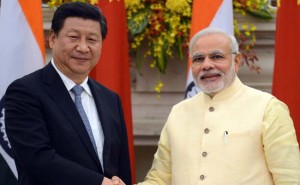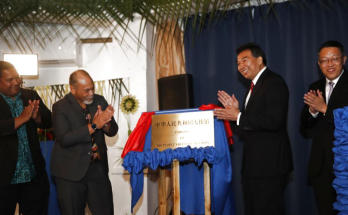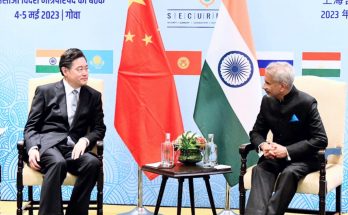 The nuclear wall seems to be rising between the two Asian giants, with China hedging on India’s membership of the Nuclear Suppliers Group. Ahead of the crucial NSG plenary in Seoul on June 24, Chinese official media reports and commentaries have whipped up the argument that if New Delhi is admitted into the elite grouping, it will upset “nuclear balance” between India and Pakistan.
The nuclear wall seems to be rising between the two Asian giants, with China hedging on India’s membership of the Nuclear Suppliers Group. Ahead of the crucial NSG plenary in Seoul on June 24, Chinese official media reports and commentaries have whipped up the argument that if New Delhi is admitted into the elite grouping, it will upset “nuclear balance” between India and Pakistan.
This argument, trumpeted by the Chinese media, comes ahead of the expected meeting between Prime Minister Narendra Modi and China’s President Xi Jinping on the sidelines of the SCO summit in Tashkent next week.
India’s entry into NSG will “shake strategic balance in South Asia and even cast a cloud over peace and stability in the entire Asia-Pacific region”, an article in the influential ‘Global Times’ said. However, the article, authored by Fu Xiaoqiang, Rsearch Fellow with the state-run think tank China Institute of Contemporary International Relations, said that China could support India’s inclusion in the 48 member nuclear club if it “played by rules”.
“Becoming a member of the NSG, a bloc that governs civilian nuclear trade worldwide, will grant India global acceptance as a legitimate nuclear power,” said the article headlined, “Beijing could support India’s NSG accession path if it plays by rules”.
Another commentary in The Global Times has argued that India’s admission into NSG would “jeopardise” China’s national interest and touch a “raw nerve” in Pakistan.
“If it joins the group, New Delhi will be able to import civilian nuclear technology and fuels from the international market more conveniently, while saving its domestic nuclear materials for military use,” said the article. “The major goal for India’s NSG ambition is to obtain an edge over Islamabad in nuclear capabilities. Once New Delhi gets the membership first, the nuclear balance between India and Pakistan will be broken,” it said.
“As a result, Pakistan’s strategic interests will be threatened, which will in turn shake the strategic balance in South Asia, and even cast a cloud over peace and stability in the entire Asia-Pacific region,” it said.
“It was only several years ago that Modi could not even get a US visa, but now he has visited the US more often than any other country during his two years in office,” it said.
The article also reflects Beijing’s resentment of the burgeoning India-US relations, especially in strategic and military areas. The US recognised New Delhi as a “major defence partner” during Mr Modi’s recent visit, meaning that the White House has given India the treatment as a US military ally, it said. Beijing suspects that New Delhi and Washington are ganging up to contain China, a perception that has been repeatedly countered by India.
Author Profile
Latest entries
 India and the WorldAugust 25, 2019Amid Pakistan’s Kashmir fury, UAE, Bahrain fete Modi with top civilian honours
India and the WorldAugust 25, 2019Amid Pakistan’s Kashmir fury, UAE, Bahrain fete Modi with top civilian honours India and the WorldAugust 15, 2019India@72: Modi unveils Rs100-trillion infrastructure upgrade for $5 trillion economy
India and the WorldAugust 15, 2019India@72: Modi unveils Rs100-trillion infrastructure upgrade for $5 trillion economy India and the WorldJuly 22, 2019Chandrayaan-2 launch: India’s Moon dreams soar high
India and the WorldJuly 22, 2019Chandrayaan-2 launch: India’s Moon dreams soar high India and the WorldFebruary 20, 2019Saudi Arabia bets on $100 billion India opportunity, backs terror concerns
India and the WorldFebruary 20, 2019Saudi Arabia bets on $100 billion India opportunity, backs terror concerns







